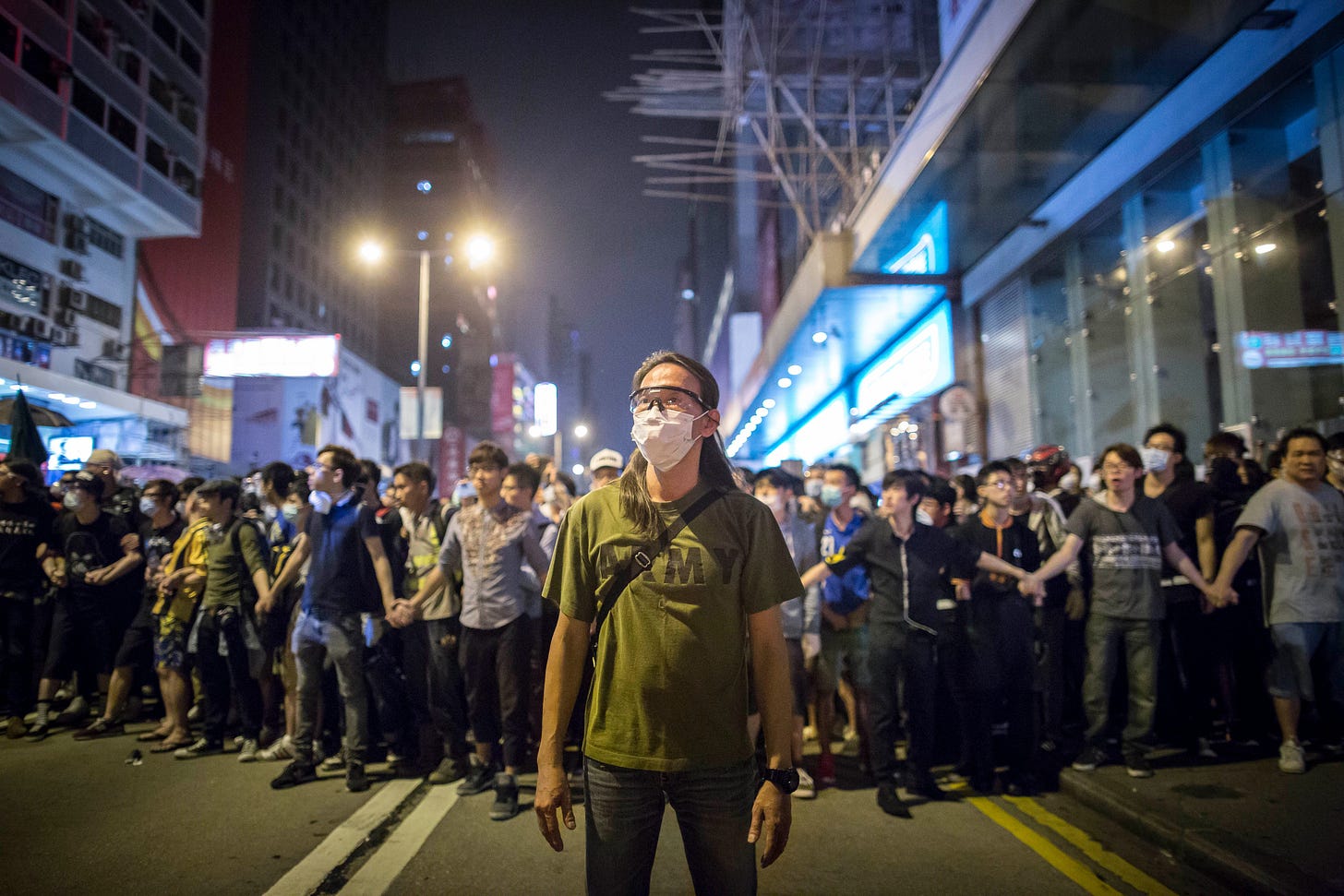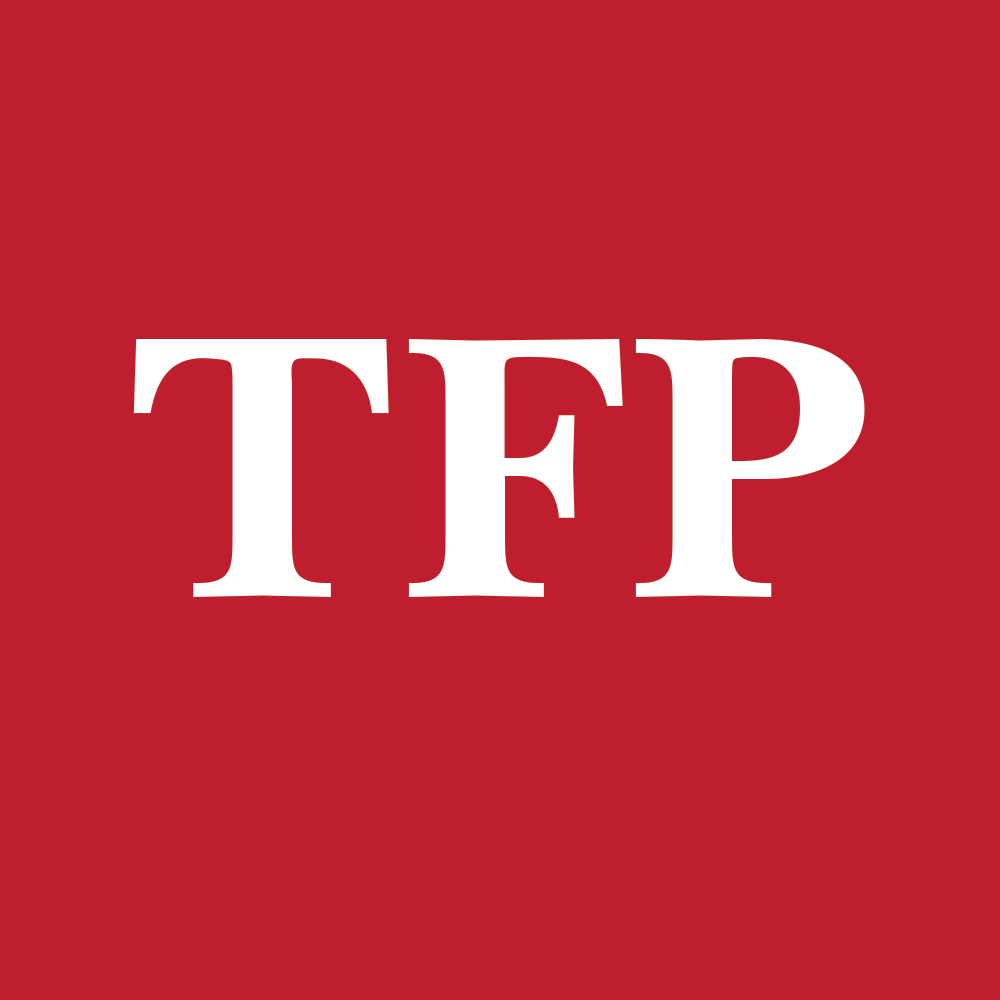A Christmas Prayer for Jimmy Lai
Hong Kong's champion of freedom and democracy is facing life in prison, but his heart and soul remain free this holiday season.

Hats off to The Wall Street Journal, my former employer, for continuing to pressure Beijing and its stooges in Hong Kong to release newspaperman and democracy activist Jimmy Lai from prison. As the Journal recently wrote in a hard-hitting editorial, “As Mr. Lai prepares for his fourth Christmas in prison, sanctions would be a good way for Britain to demonstrate that it takes the mistreatment of one of its citizens seriously.” The U.S., to its credit, already has, as the Journal reported, “robust sanctions in place against those officials” who have imprisoned—on bogus charges—one of Hong Kong’s greatest proponents of a free press, democracy, and all that was promised the citizens of Hong Kong before the July 1, 1997, “handover” from Great Britain to Beijing. With Jimmy Lai, who I count as a friend, in ill health this Christmas, and unjustly separated from his wife and son, I pray he be released as soon as possible, and allowed free passage to Great Britain, and the love and comfort of his family and friends. The following piece was first published by TFP just before Christmas last year, but its message is more pressing this year than ever.
— MJ
A Christmas Prayer for Jimmy Lai
By Michael Judge
Seeing Jimmy Lai in shackles entering a Hong Kong courtroom this week was a shock for me on a personal level. I’d gotten to know the Hong Kong media mogul and founder of the pro-democracy newspaper Apple Daily in the late 1990s when I worked in The Wall Street Journal’s Hong Kong bureau. He was, pardon the cliché, larger than life—a bear of a man with a gentle spirit whose passion for democracy was equaled only by his commitment to freedom of expression.
He was also a self-made man, unlike many mainland millionaires who owe their fortunes to Chinese Communist Party connections. At the age of 12, Jimmy stowed away on a ship headed from the mainland to Hong Kong and went to work in the garment industry. A brilliant apprentice, he moved up the ranks, became a manager, owner, and eventually the CEO and president of a multinational clothing and retail empire, Giordano, which at its peak had outlets across Asia.
Jimmy eventually sold off most of his garment and retail interests to launch media outlets in Hong Kong—Next Magazine in 1990 and the hugely popular Apple Daily newspaper in 1995, both of which had a hard-hitting reporting and editorial style that championed democracy and wasn’t afraid to take on Beijing or those who kowtowed to the CCP in the Hong Kong political and business world.
Whether it was at his home or a favorite Hong Kong restaurant, whenever we met there was usually a meal involved—and his appetite for good food and drink was nearly as voracious as his appetite for conversation and debate.
I first met Jimmy in 1998, the year after Hong Kong’s “handover” from Britain to Beijing, and our meetings—often with other members of the press, academics, local politicians, and human-rights activists—would inevitably turn to the ways in which the mainland was undermining its “one country, two systems” promise.
A devout Catholic, Jimmy’s faith was—and is—central to his identity, and we were frequently joined by local clergy around a big table, where Jimmy, while generously listening to all present, held court. His stories, often filled with outrage over injustices done to the Hong Kong people, ranged from the Japanese occupation during World War II to the riots against British colonial rule in the 1960s, and the threat to judicial independence after 1997. But they were also filled with goodwill, humor, and Jimmy’s bedrock belief that we, as his faith teaches, should “Do unto others as we would have them do unto us.”
In short, I looked up to Jimmy. He was to me—a young journalist on my first real overseas assignment—a symbol of the freedoms that the great majority of Hong Kongers cherished, and an example of why the “one country, two systems” promise made by Beijing in 1997 was so important.
That promise was supposed to last at least 50 years, until 2047, over which time Hong Kong would gradually expand its citizens’democratic rights. Sadly, that promise was shattered, along with the lives of Jimmy Lai and thousands of other lesser-known activists, in a brutal crackdown by craven Hong Kong authorities under the sway of Communist Party leaders in Beijing.
Visibly thinner and fatigued after more than a thousand days behind bars, Jimmy, who turned 76 earlier this month, is currently imprisoned in a maximum-security cell under bogus “fraud” charges. He now faces life in prison on equally ludicrous “national security” charges of publishing “seditious materials.”
But as any honest individual knows, it is not Jimmy Lai but those who do the bidding of the Chinese Communist Party in Beijing that are the true threats to Hong Kongers’ “national security” and way of life.
As Mark Clifford, award-winning journalist and president of The Committee for Freedom in Hong Kong, told me this week, instead of living up to the promise of one country, two systems, “China’s Xi Jinping demands total submission. Even one person sticking up is like a nail that needs to be hammered down.”
“Of course,” Clifford continued, “Jimmy is not your average nail. His advocacy on behalf of freedom, his advocacy for the democracy that China promised Hong Kong, is an unambiguous challenge to a communist dictatorship. It doesn’t matter that Jimmy is a 76-year-old man who has always preached nonviolence. He dares to challenge Beijing through his commitment to truth and by having strong moral values that he has the courage to live and, if necessary, die by.”

Sebastien Lai, Jimmy’s son, who was just a young boy the last time I met him, is heading the international campaign to free his father, tirelessly meeting with legislators, human-rights organizations, and heads of state around the globe. Writing in The Globe and Mail this week, Sebastien, now 28, said:
In 2020, the Hong Kong government accused my father, Jimmy Lai, of charges under China’s national security law, including “colluding with foreign forces” and sedition. The truth is much less convoluted. For almost three decades, my father published Apple Daily, the city’s largest pro-democracy newspaper, and was one of Beijing’s most outspoken and dauntless critics.
For this, the authorities are putting on an elaborate show to discredit and silence him.
On Monday morning, when his sham trial finally began after more than 1,000 days of pre-trial detention, sniffer dogs patrolled the street outside of West Kowloon Court, and police officers deployed to secure the area—1,000 of them, according to reports—scanned passing cars for bombs. Law enforcement dwarfed both press presence and the crowd queueing to witness the trial. Local media have reported that the same show of force will be deployed every day for the duration of my father’s 80-day trial.
The tight security, like the trial itself, is a co-ordinated performance to paint him as a dangerous man. But, in reality, it betrays something else: how terrified tyranny is of defiance, and how insecure Beijing and its puppets are in the face of a man who stands up for freedom and speaks truth to power, whatever the cost may be.
I’m not sure how much access Jimmy has to the outside world, but I’m sure of one thing: He’s proud of his boy, Sebastien, no matter what the outcome of his sham of a trial. The irony is almost too painful. In a Kafkaesque nightmare, a man who believes in truth and justice finds himself in a predetermined trial that respects neither. Yet, unlike Kafka’s Josef K in The Trial, Jimmy, like Socrates, has lived a fully examined life, guided by faith not fear, truth not deception.
As Clifford, a longtime friend and colleague of Jimmy’s, explained in my TFP interview with him last year upon the release of his book, Today Hong Kong, Tomorrow the World, China’s Communist leaders “crave legitimacy, but they fear their own people. And they know that despite all the material progress, building the second-largest economy in the world, et cetera, their people don’t have freedom.”
By contrast, Jimmy Lai’s sense of certainty in his cause—buoyed by his love for his wife, Teresa, his children, and his Catholic faith—continues to flourish, even behind bars. As I wrote in my interview with Clifford, perhaps the most stirring words in his book—itself a moving testament to the character and endurance of Hong Kong’s democracy activists—weren’t written by the author but by Jimmy, in a letter to his old friend and fellow newspaperman:
I’m adjusting very well in prison. Without the distraction of the world I can concentrate on reading my books, especially books I didn’t understand [before], I can understand now. It’s such a joy. My family, colleagues, and friends and even people here have been very supportive. I know I must have done the right thing. The Lord has rewarded me with sweet joy and love. … I used to think I love[d] freedom the most. Now I know I love Teresa the most. I’m a lucky man. My life has been so wonderful. I can face whatever suffering [is] coming forth on me. … Yes, I’ve enemies. But funny enough I don’t have a bit of hate, not even a tiny bit. I tell myself if I can pray for my enemies and wish them well, I’ll have no fear. I really have no fear. I believe at the end righteousness and justice will prevail.
This Christmas, I pray Jimmy is right. I also pray that I, and all those who know him—especially his family and loved ones—find strength in the courage of his convictions, and peace in the example of his compassion. But most of all I pray for my friend, that he may return to the loving arms of his Teresa.


Thank you for this piece. I knew about Jimmy Lai, but not the details you've outlined here. Authoritarian governments fear those who stand up for truth and freedom. I fear for journalists here in the U.S. now, too. Free Jimmy Lai!
Thanks Michael for this prayer and reminder of the press freedom we once had in my city. A Merry Christmas to you too.